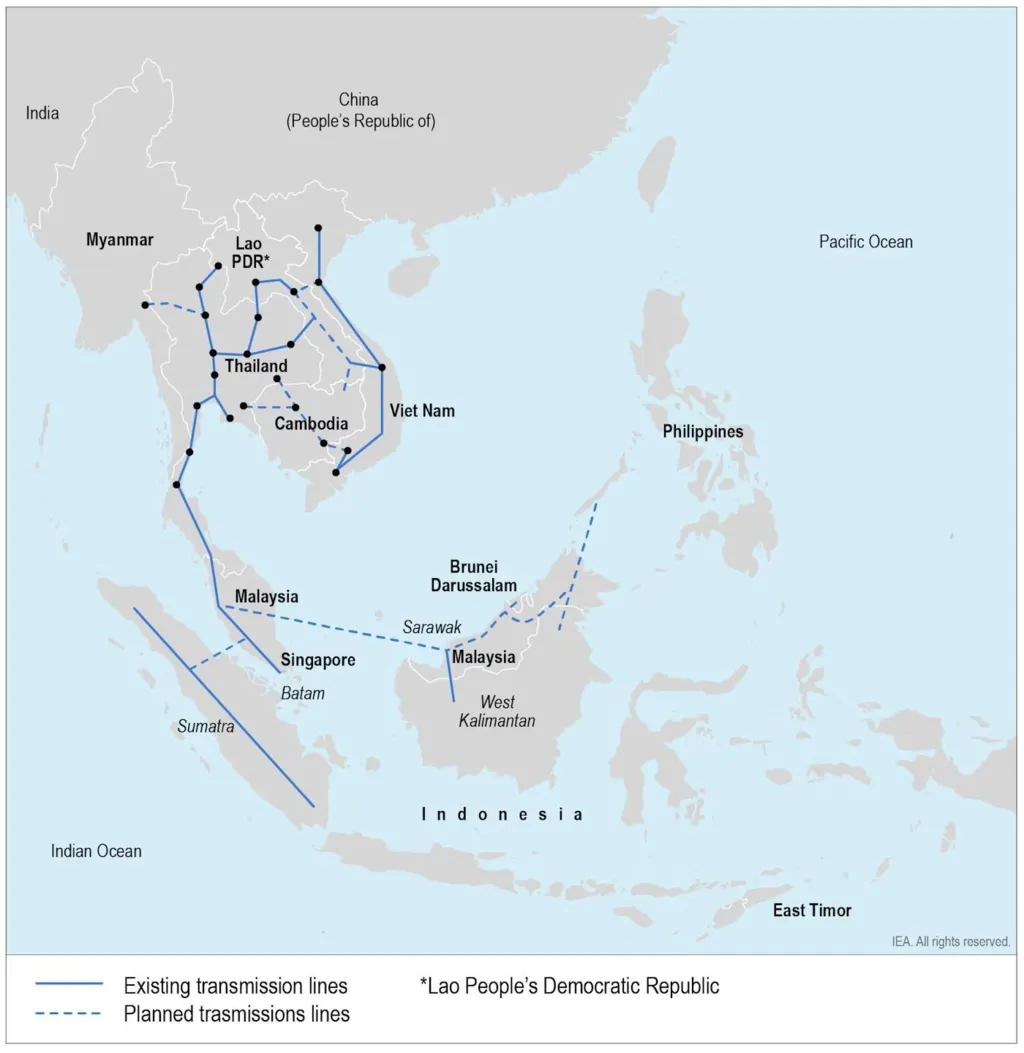As of October 2025, power exports from Laos to Singapore are at a standstill. The reason? A single missing regulatory sign-off from Thailand. Despite regional agreements being ready, the 100 MW cross-border pilot under the ASEAN Power Grid is now on pause. It is a vivid example of Southeast Asia Power Deal Dispute and how politics can freeze progress.
The Promise Behind the ASEAN Power Grid

The Lao PDR–Thailand–Malaysia–Singapore Power Integration Project began in 2022 as a bold step toward regional energy sharing. The plan was simple: send up to 100 megawatts of hydropower from Laos through Thailand and Malaysia to Singapore. In practice, it has turned into one of ASEAN’s most visible tests of regional cooperation and energy integration.
At the heart of the problem lies a regulatory roadblock in Bangkok. Thailand’s National Energy Policy Council, the body responsible for approving transmission fees and wheeling agreements, has yet to finalize charges for cross-border electricity flow. And without that approval, Laos cannot transmit power through Thai territory to reach Malaysia and Singapore.
Political Shifts Deepen the Southeast Asia Power Deal Dispute
Thailand’s council underwent major leadership changes after the government transition earlier in 2025. Those reshuffles have delayed decision-making and frozen approvals critical to the project’s timeline.
Officials confirm that “the approval is still required from Thailand”, but no timeframe has been given. The future of this 100 MW pilot — enough power for nearly 150,000 Singaporean homes — depends on one council’s next meeting.
For Malaysia and Singapore, the delay is both frustrating and familiar. Both countries have already agreed on wheeling charges and technical terms. Yet electricity cannot flow unless Thailand signs off.
Malaysia’s energy minister noted that “domestic political changes in neighboring states have disrupted the schedule.” This statement highlights how dependent cross-border power deals are on local political stability.
Read Also: ASEAN's Rise: SEA Influence Index Trends Reveal Shifting Power
The Wider Meaning of the Southeast Asia Power Deal Dispute
This situation shows how fragile ASEAN’s energy cooperation can be. The ASEAN Power Grid was meant to reduce fossil-fuel dependence and make clean power trade seamless. But the current impasse shows that even well-planned projects can stall when domestic politics interfere.
The numbers speak clearly. One hundred megawatts of renewable power are ready to move. The infrastructure exists, and technical coordination is done. Yet everything is frozen by one missing regulatory approval.
A Symbol of ASEAN’s Integration Challenge
Beyond the halted electricity, the dispute carries symbolic weight. The Lao–Thailand–Malaysia–Singapore initiative was meant to prove that ASEAN could shift from bilateral to multilateral energy trade. Instead, it now serves as a barometer of how politics can derail integration.
When institutions like Thailand’s National Energy Policy Council reset after every election, project continuity suffers. In a region as interconnected as Southeast Asia, such interruptions affect everyone.
Read Also: Southeast Asia Carbon Credit Market Emergence
Lessons From Southeast Asia Power Deal Dispute
This dispute raises a key question: How can ASEAN protect major projects from domestic political cycles?
Without stronger regional mechanisms to preserve agreements through leadership changes, delays like this will repeat. Energy cooperation can’t rely on political timing — it needs lasting frameworks that transcend elections and transitions.
Navigating Uncertainty With Expert Guidance
Until Thailand finalizes its decision, the region’s vision for an integrated power grid remains incomplete. The Southeast Asia Power Deal Dispute stands as a clear reminder that regional ambition must be matched with institutional stability. To explore how global consulting expertise can help manage political, regulatory, and infrastructure challenges, contact Market Research Southeast Asia, a trusted partner in energy transition and regional integration strategy.







